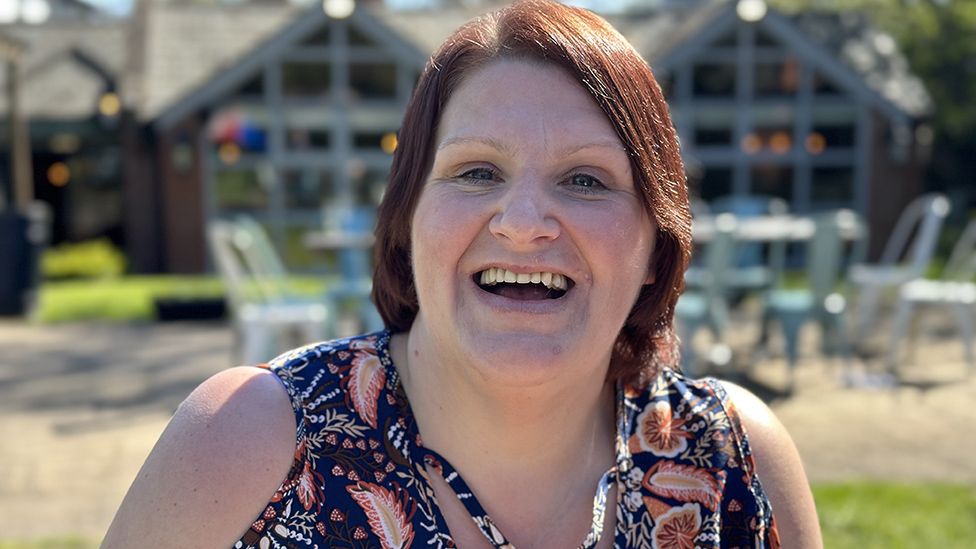ARTICLE AD BOX

Danielle shows off her new dentures
By Ruth Green & Dominic Hughes
BBC News
A woman who extracted her own teeth because she couldn't find an NHS dentist says crowdfunding a new set of dentures has transformed her life. On Tuesday afternoon, MPs will question dental experts from NHS England as part of an official inquiry prompted by a BBC investigation into the dentistry crisis.
One by one, over several months, Danielle Watts pulled out 13 of her own teeth.
For years she had been living with terrible pain and discomfort as a result of chronic gum disease, which meant that her teeth - otherwise healthy and unaffected by decay - were becoming loose and falling out.
But Ms Watts, from Bury St Edmunds in Suffolk, found herself in a "dental desert" - an area where no dentists offer NHS care - and couldn't afford the thousands of pounds of private treatment needed to fix her teeth.
Image source, MIKE LIGGINS/BBC
Image caption,Danielle was in constant pain and self-conscious about how she looked and spoke
Now, a crowdfunding campaign has helped raise enough money to let her have a set of dentures fitted - meaning she can smile again.
"I've got a mouthful of teeth, which feels amazing," Ms Watts says. "I'm not ashamed any more."
The BBC featured her story last year - when our research revealed the extent to which people across the UK were struggling to access NHS dentistry.
The Covid pandemic had left dental practices with severe backlogs of patients needing appointments, and this exacerbated an NHS funding gap which meant dentists had to take on more private work to survive.
- Nine in 10 NHS dental practices across the UK were not accepting new adult patients for treatment under the health service
- In a third of the UK's more than 200 council areas, no dentists were taking on adult NHS patients, and
- Eight in 10 NHS practices were not taking on children
Following our investigation, the Health and Social Care Committee launched an inquiry into dentistry, and the cross-party committee is due to hear evidence from senior NHS England and government figures on Tuesday.
The Department of Health in England says improving NHS access is a priority, and that it has made an extra £50m available "to help bust the Covid backlogs" - but tens of thousands of people, like Ms Watts, are still struggling to find an NHS dentist.
Last August, she described how she no longer smiled at people and had stopped going out and socialising.
"I won't go out and meet new people. I avoid crowded situations. I walk with my head down all the time," she told us.
Describing herself as "quite a happy, smiley person", she said she would hang her head to hide her mouth when she laughed in front of people, "because I know what they're seeing".
Image source, Mike Liggins/BBC
Image caption,Danielle Watts did not dare to smile in front of people because of her missing teeth
At the time, Ms Watts's despair was striking.
"I'm 42 years old and I can't eat and drink. I'm on painkillers every day. I'm not a 90-year-old woman. This shouldn't be happening to me now," she said.
Not only was eating increasingly difficult, but her damaged gums were also at risk of infection. In fact, late last year she was hospitalised for three weeks after one such infection got out of control.
But following our report, a friend persuaded her to set up a crowdfunding page to see if they could raise the money to get her teeth fixed.
It raised about £2,500, which - along with some funds raised by her mother's church - was enough to get Ms Watts fitted with a set of dentures.
More on NHS dentistry crisis
She says the kindness of strangers has completely transformed her life.
"I'm in no pain at all, there is no bleeding, my teeth are all facing the same way," she says.
"I don't have to hide anymore. To be able to talk to somebody face-on, to be able to smile at somebody, is something I haven't done for several years."
Some people are going to extraordinary measures to do DIY dentistry as they struggle to find affordable dental care. Are we witnessing the death of NHS dentistry?
Ms Watts knows she is extremely lucky - and that not everyone will be able to benefit from the sort of crowdfunding campaign that helped her.
"Part of me feels bad because there are so many people who are in my position, but they haven't had that help - so I feel very guilty as well as being incredibly grateful."
She says she feels especially privileged because people donated money during a cost-of-living crisis.
"People still put their hands in their pockets and gave what they could - it's absolutely massive."

 2 years ago
65
2 years ago
65








 English (US) ·
English (US) ·